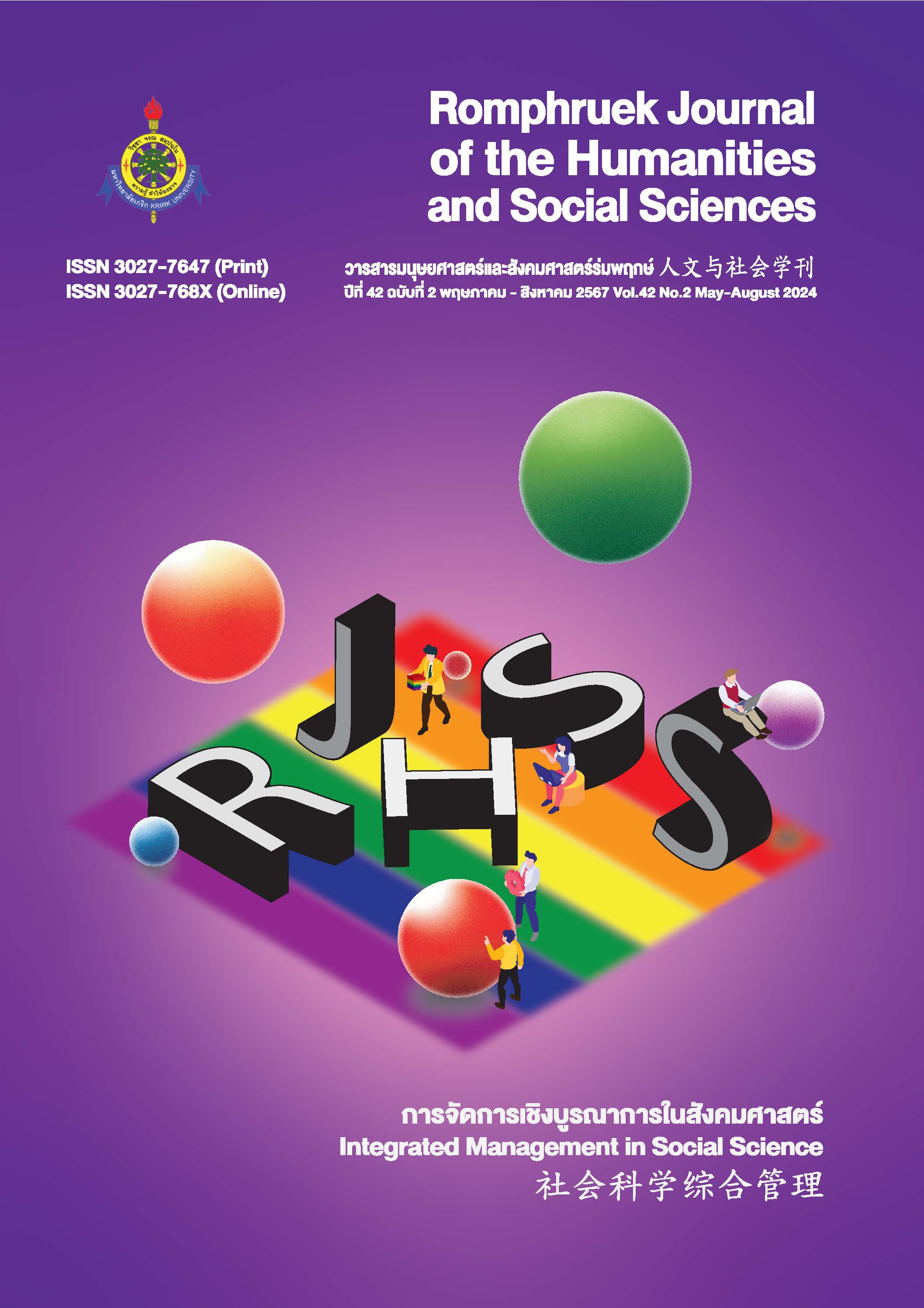The Effect of Phenomenon-Based Learning Experience Provision for The Development Problem-Solving Skills in Early Childhood
Main Article Content
Abstract
The purpose of this study is to arrange early childhood problem-solving experiences through the use of phenomenon-based learning experiences. The target group consisted of 25 male and female, age 4 to 5 pre-school children, who were studying in kindergarten level 2 in the first semester of the academic year of 2023 in Ban Pa Wang Kwang School, Saraburi Primary Educational Service Area Office 2.The research tools included 24 phenomenon-based experience plans, and a form to assess the problem-solving skills of early childhood children. Quantitative data analysis using the average, standard deviation, and qualitative data were analyzed by content analysis and descriptive analysis.
The results of the study found that the early childhood children who received a phenomenon-based experience had higher problem-solving skills, both overall and in particular area than they had prior to the organized activity. The step with the highest average score after the experiment was the implementation and review of guidelines, followed by problem identification, searching for ways to solve problems, and brainstorming to find solutions, respectively.
Article Details

This work is licensed under a Creative Commons Attribution-NonCommercial-NoDerivatives 4.0 International License.
Every article published in the Romphruek Journal of the Humanities and Social Sciences is the opinion and point of view of the authors. Thery're not the viewpoint of Krirk University or the editored department. Any part or all of the articles for pablication must be clearly cited.
References
กระทรวงศึกษาธิการ. (2560). หลักสูตรการศึกษาปฐมวัย พุทธศักราช 2560. โรงพิมพ์ชุมนุมสหกรณ์การเกษตร
แห่งประเทศไทย.
กฤษดา เรืองอารีย์รัชต์. (2558, 7 กันยายน). หนุนคิดเป็นแก้ปัญหาได้ วิธีเรียนยุคใหม่เด็กไทย. สำนักงานกองทุนสนับสนุนการสร้างเสริมสุขภาพ. https://www.thaihealth.or.th/Content/29355.
ชลาธิป สมาหิโต. (2562). การจัดประสบการณ์การเรียนรู้โดยใช้ปรากฏการณ์เป็นฐานสำหรับเด็กปฐมวัย. วารสารมหาวิทยาลัยศิลปากร, 39(1), 113-129.
ชญาภรณ์ เอกธรรมสุทธิ์ และ เกสร สุวิทยะศิริ. (2560). “การสร้างความรู้ ผ่านทักษะการคิดแก้ปัญหา.” วารสารวิทยาลัยพยาบาลบรมราชชนนี, 33 (1), 177 – 183.
ญาดา ช่อสูงเนิน. (2555). การคิดเชิงเหตุผลของเด็กปฐมวัยที่ได้รับการจัดประสบการณ์แบบสร้างองค์ความรู้ตามแนวสตัคติวิสต์. (วิทยานิพนธ์ปริญญามหาบัณฑิต, มหาวิทยาลัยศรีนครินทรวิโรฒ.) ThaiLIS. http://thesis.swu.ac.th/swuthesis/Ear_Chi_Ed/Yada_C.pdf.
ทิศนา แขมมณี. (2560). รูปแบบการเรียนการสอน: ทางเลือกที่หลากหลาย. สำนักพิมพ์แห่งจุฬาลงกรณ์มหาวิทยาลัย.
ประพันธ์ศิริ สุเสารัจ. (2556). การพันฒนาการคิดฉบับปรับปรุงใหม่ (พิมพ์ครั้งที่ 5). โรงพิมพ์ห้างหุ้นส่วนจำกัด 9119 เทคนิคพริ้นติ้ง.
ราชวิทยาลัยกุมารแพทย์แห่งประเทศไทย. (2560, 11 ตุลาคม). คู่มือสำหรับพ่อแม่ เพื่อเผยแพร่ความรู้ด้านการดูแลและพัฒนาเด็กเด็กวัยอนุบาล 3-6 ปี. ThaiPediatrics. http://www.thaipediatrics.org/Media/media-20171010123112.pdf.
พรสวรรค์ วงค์ตาธรรม. (2558). การคิดแก้ปัญหาเชิงสร้างสรรค์ ทักษะการคิดในศตวรรษที่ 21. วารสารศึกษาศาสตร์ มหาวิทยาลัยขอนแก่น, 11(2), 111-121.
สรวงมณฑ์ สิทธิสมาน. (2562, 30 ตุลาคม). ทักษะการแก้ปัญหาของเด็กหายไปไหน !. mgronline.
https://mgron line.com/qol/detail/9620000079842.
สำนักงานคณะกรรมการการศึกษาขั้นพื้นฐาน. (2559, 1 กันยายน). แนวทางการจัดการเรียนรู้ในศตวรรษที่ 21. มหาวิทยาลัยเทคโนโลยีราชมงคลล้านนา. https://webs.rmutl.ac.th/assets/upload/files/2016/09/20160908101755_51855.pdf.
อรพรรณ บุตรกตัญญู. (2561). การเรียนรู้โดยใช้ปรากฎการณ์เป็นฐานเพื่อการสร้างมุมมองแบนองค์รวมและการเข้าถึงโลกแห่งความจริงของผู้เรียน. วารสารครุศาสตร์ จุฬาลงกรณ์มหาวิทยาลัย, 46(2), 348-365.
Daehler, K. R., & Folsom, J. (2016, Jun 5). Making Sense of SCIENCE: Phenomena-Based Learning. Pub HTML5. http://www.WestEd.org/mss.
Daly,L,& Beloglovsk, M.(2015). Loose parts: Inspiring play in young Children. Redefeat Press.
Dewey, J. (1983). The middle works, 1899-1924 (13th ed.). SIU press.
Dyah, M. D. and Setiawati, A. F. (2019). “The Problem Solving Skills in Kindergarten Student Based on the Stages of Problem Solving.” Jurnal Pendidikan Anak Usia Dini, 3(1), 274 – 282.
Dougherty, K. (2015, January 25). Global Trends in Project Based Learning: From the UK, to Finland and Beyond! Education Insider. Science and Education. https://blog.iat.com /2015/06/26/ new-global-trends-in-project-based-learning/.
Fisher, C. J., & Terry, C. (1990). Children’s Language and the Language Arts. McGraw-Hill.
Jeffrey Baumgartner. (2020). The Basics of Creative Problem Solving – CPS. ACTS. https://shorturl.asia/ZGXlk.
Ismail, N. et. al. (2019). ''The Effect of Maternal Scaffolding on Problem Solving Skills during Early Childhood.'' The Journal of Behavioral Science, 14(3),76 - 89.
Izzaty, R. E. (2010). Pemecahan Masalah Sosial sebagai Faktor dalam Pendidikan Karakter Anak Usia Dini. Jurnal Psikologi, 6(2), 156–170.
Philosophy for Children New Zealand. (2020). About P4C. P4CNZ. http://www.p4c.org.nz/ about.
Piaget, J. (1952). The Original of Intelligence in Children. Trans, by Marget Cook. Internayional Universitie Press.
Silander, P. (2015, Nov 17). Phenomenon-based learning. Science and Education. http://www.phenomenoleducation.info/phenomenon-based-learning.html.
Swartz, R., Costa, A., Beyer, B., Kallick, B., & Reagan, R. (2008). Thinking based learning. Teachers College Press.


